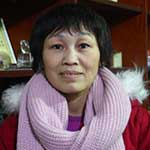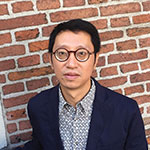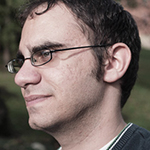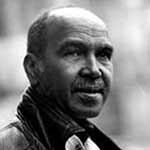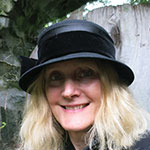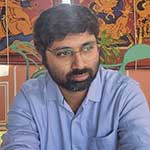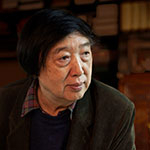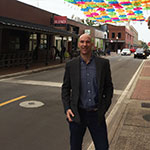Find your favorite authors featured in WLT or browse the entire list.
Mehrdad Fallah
Mehrdad Fallah (b. 1960) is one of the most influential Iranian poets of recent decades. The author of ten books of poetry, Fallah has also published a translation of Allen Ginsberg’s Howl and a collection of critical essays on contemporary Iranian poetry.
Fan Yusu
Fan Yusu came from Xiangyang City in Hubei Province. She was a member of the Picun Literature Group and attended the Writers’ Seminar organized by the Lao She Literature Academy. Currently she is the editor in chief of New Workers Literature. Once a live-in nanny, now Fan works as a janitor in Beijing.
Kit Fan
Kit Fan was born and educated in Hong Kong before moving to the UK at twenty-one. His second collection, As Slow as Possible, was a Poetry Book Society Recommendation, one of the Guardian’s fifty biggest books in 2018, and The Irish Times Poetry Book of the Year.
Brian Fanelli
Brian Fanelli’s poetry has been nominated for a Pushcart Prize and has appeared in a number of magazines and journals, most recently Oklahoma Review, Spillway, Boston Literary Magazine, Portland Review, and Third Wednesday. Fanelli is the author of one chapbook, Front Man (Big Table Publishing), and the full-length collection All That Remains, forthcoming soon from Unbound Content. Prior to working as a full-time English instructor at Lackawanna College, Fanelli worked a number of jobs, including country clerk, factory worker, and adjunct instructor. He has an MFA from Wilkes University and is currently a PhD student at SUNY Binghamton.
Fang Qi
Acclaimed in China, Fang Qi has published two works: Elegy of a River Shaman and The Ivory Bed of the Princess. A long-term researcher of myths and shamanism, she devoted her life to examining, cataloging, and preserving the folklore of and archaeological excavations from the middle and upper Yangzi Valley.
Liu Fang
A child prodigy in China, Liu Fang is recognized as one of the most eminent pipa soloists as well as a sensitive performer on the guzheng. She has collaborated with world-class musicians from various traditions and has released eleven solo and collaborative albums. She now lives in Canada.
Nuruddin Farah
Nuruddin Farah (b. 1945) was born in the Italian-ruled southern region of Somalia, Baidoa. His mother was a traditional storyteller, and his father was a merchant who later worked for the British government as an interpreter. Farah lived in a multilingual environment and learned to speak Somali, Amharic, English, Italian, and Arabic. When he began to write, Farah chose English as the language of his works. His first novel, From A Crooked Rib (1970), depicts the authoritarian role of patriarchy in African society and earned Farah praise as a "male feminist." The publication of his second novel, A Naked Needle (1976), angered the Somalian dictatorial regime and finally forced Farah into exile after receiving death threats. Farah would not return to live in Somalia again, but his lifelong pursuit is to keep his country through his writing.
Jeanne Farewell
Jeanne Farewell is the author of six novels and the short-story collection Nantucket Snow. Also a pianist, Farewell has performed in the US, Europe, and China. She gives lecture-recitals about music and its associations with art and literature.
Mohd Farhan
Mohammad Farhan teaches English at Jamia Millia Islamia, New Delhi, India. He’s a regular contributor to various reputed newspapers and literary magazines including Wasafiri, among others.
James Farner
James Farner is a WLT intern studying English writing and religious studies at the University of Oklahoma. In his free time, he’s either listening to a podcast or working on The Aster Review, an OU student arts publication. He grew up in and around Minneapolis and is one of the frequenters of First Avenue who left flowers at Paisley Park after Prince died.
Clelia Farris
Clelia Farris has won three Italian science-fiction awards for her novels Rupes Recta, Nessun uomo è mio fratello, and La pesatura dell’anima. Rachel Cordasco’s translation of Farris’s story “The Substance of Ideas” appeared in Future Science Fiction Digest’s December 2018 issue.
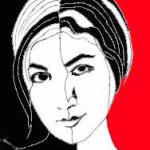
Photo © www.mahmag.orgdiv>Forugh Farrokhzad
Forugh Farrokhzad (1935–1967) was an Iranian poet and filmmaker. Her published works include The Captive, The Wall, Rebellion, Reborn, and Let Us Believe in the Dawn of the Cold Season. She broke with many traditional conventions and thus exercised an immeasurably important influence on modern Iranian poetry.
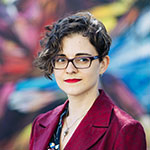
Photo by Vinciane Lebrundiv>Mélanie Fazi
For her two novels and three story collections, Mélanie Fazi (b. 1976) has won the Grand Prix de l’Imaginaire, the Prix Masterton, and the Prix Merlin each several times. Active in the contemporary French speculative-fiction community, she lives in Paris and is a member of the Deep Ones, a collective of musicians and writers who give live readings with musical accompaniment.
Lori Feathers
Lori Feathers (@lorifeathers) is a co-owner of Interabang Books in Dallas, Texas, and the store’s book buyer. She writes freelance book reviews, sits on the board of the National Book Critics Circle, and is a fiction judge for the 2018 Best Translated Book Award.

Photo © Petra Szőcsdiv>Renátó Fehér
Renátó Fehér (b. 1989, Szombathely, Hungary) has published two collections of poetry in Hungarian: Garázsmenet (2014) and Holtidény (2018). A defining voice in the new generation, Fehér’s first collection sought out the identity of a country, a family, and a postsocialist Hungarian generation. His latest collection acknowledges the continual presence of past events and asks, Where to next?
Marguerite Feitlowitz
Marguerite Feitlowitz teaches literature at Bennington College, where she is founding director of Bennington Translates. Recent publications include translations of Luisa Valenzuela, Liliane Atlan, and Salvador Novo.
John Felstiner
John Felstiner (b. 1936) recently retired after teaching at Stanford for forty-nine years. His major books include Translating Neruda: The Way to Macchu Picchu; Paul Celan: Poet, Survivor, Jew; Selected Poems and Prose of Paul Celan; Can Poetry Save the Earth? A Field Guide to Nature Poems; and Jewish American Literature.
Feng Jicai
Feng Jicai (b. 1942) is a contemporary Chinese writer, painter, and cultural scholar. He was also a professor at Tianjin University. Feng started publishing literary works in 1977. His most important works include Shenbian (1984; The wonder queue), which won the National Outstanding Novella Prize; the short story “Shitou Shuohua” (1998; The stone talks), which won China’s October Literature Prize; and the short-story collection Sushi Qiren (2018; Rarities in the secular world), which won the Lu Xun Literary Prize.
Enrica Maria Ferrara
Enrica Maria Ferrara is a writer, translator, and scholar in Italian literature and film working at Trinity College Dublin. Recent publications include Posthumanism in Italian Literature and Film: Boundaries and Identity (Palgrave, 2020), of which she is the editor, and Reading Domenico Starnone, a special issue of Reading in Translation (co-edited with Stiliana Milkova, 2021).
César Ferreira
César Ferreira is a professor of Spanish at the University of Wisconsin–Milwaukee, where he teaches contemporary Latin American literature.
Jorge Ferrer
Havana-born Jorge Ferrer is a writer, editor, and award-winning translator. Among the authors he has translated into Spanish are Alexandr Herzen, Ivan Bunin, Svetlana Alexievich, Vasily Grossman, Guzel Yakhina, and Vasily Rozanov. In 2012 he received the Boris Yeltsin Foundation’s “Russian Literature in Spain” prize. He lives in Barcelona.
Feyziyye
Feyziyye was born in 1982. She works as a newspaper journalist in Baku. She has published one book of poetry, Message. Her poetry takes up themes of war and displacement.
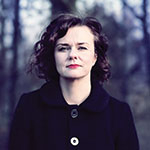
Photo by Radek Kobietskidiv>Julia Fiedorczuk
Julia Fiedorczuk (b. 1975) is a Polish poet, prose writer, translator, and lecturer in American literature at the University of Warsaw. She has published five books of poetry, a collection of short stories, and two novels. Her Pushcart-nominated poem “Lands and Oceans” appeared in the November 2014 issue of WLT. Her most recent book, Nieważkość, was nominated for the Nike Prize. Oxygen, a volume of selected poetry translated by Bill Johnston, is forthcoming from Zephyr Press in 2017.
Elizabeth Fifer
Elizabeth Fifer is a professor of English (emerita) at Lehigh University. She writes on contemporary world literature.
Marilyse Figueroa
A recent graduate of the University of Oklahoma and former WLT intern, Marilyse Figueroa now lives in and writes from San Antonio, Texas.
Vera Filenko
Vera Filenko writes feature scripts, prose, and poetry in Russian and English. Her prose has been published in Belarusian and Russian independent media and literature almanacs (Snob, Makulatura, AST). She received a grant from the Union of Belarus Writers for publishing her shorty-story collection Transfer Me (2018).
Gary Fincke
Gary Fincke’s newest collection, The Infinity Room, won the Wheelbarrow Books Prize for Established Poets (Michigan State, 2019). Earlier collections have been published by Arkansas, Ohio State (2003, OSU/The Journal Prize), BkMk, Zoland, Stephen F. Austin (2011, SFA Prize), and Jacar (2015 Book Prize). Other book-length work has won the Flannery O’Connor Prize for Short Fiction, the Robert C. Jones Prize, and the Elixir Press Fiction Prize.
Jonathan Fink
Jonathan Fink (jonathanfink.com) is professor and director of Creative Writing at the University of West Florida. He has published two books of poetry: The Crossing (Dzanc, 2015) and Barbarossa: The German Invasion of the Soviet Union and the Siege of Leningrad (Dzanc, 2016). His poems and essays have appeared in the New York Times Magazine, Poetry, New England Review, TriQuarterly, Southern Review, Virginia Quarterly Review, Slate, and Witness, among other journals.
Nancy Finn
Nancy Finn teaches dramatic literature and Irish studies in the English Department at the University of Massachusetts Boston, and theater studies in the Performing Arts Department at Emerson College. She received her PhD in theater from the University of California at Santa Barbara. Her research interests include modern and contemporary Irish theater and drama, contemporary women playwrights, and theater historiography. She is also an actor and dramaturge. She is currently writing a monograph on the work of Marina Carr.
Peppe Fiore
A native of Naples, Peppe Fiore lives and works in Rome. In addition to Nessuno è indispensabile, he is the author of two short-story collections and a second novel, La futura classe dirigente (The future ruling class). His interest in writing about the world of work, he says, is tied to the way “working life becomes a useful framework for understanding how we function as a species.”
Pagination

